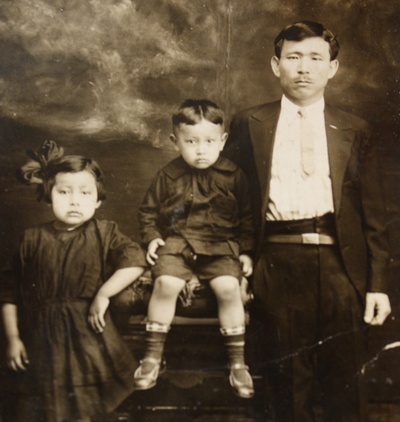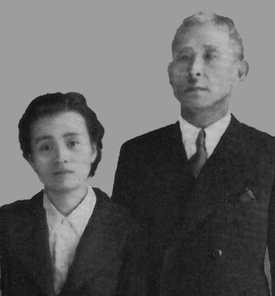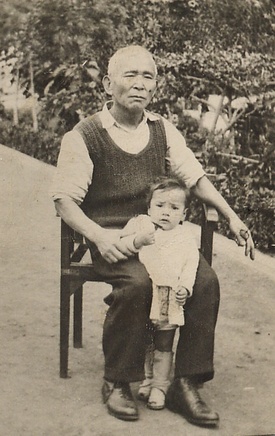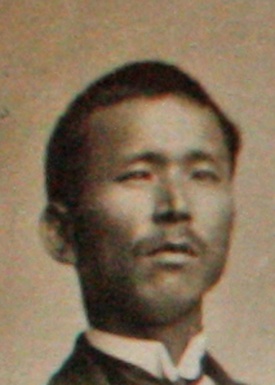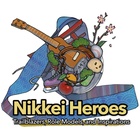Over time, my concept of who is a hero has changed substantially, and the people I admired for their accomplishments and virtues when I was a girl are not the same people I admire today. Thanks to Pioneros (Pioneers), a database of Japanese immigrants in Peru (1899-1941), for the first time I was able to obtain information about my grandfather, Kiyoshi. This eventually led me to obtain my grandfather’s Koseki (Japanese family record), and as a result I developed a clearer image of the person who I now consider my hero: my grandfather, Kiyoshi Kuwahara.
My childhood was spent in the city of Iquique, in the arid desert of northern Chile. I grew up in a tranquil place, accompanied by my grandparents Kiyoshi and Matsuno. They had married ten years after my grandfather’s first wife had died. At the time, my grandfather was a widower with two children, and my grandmother was a widow with a daughter of her own; fortunately, the three grew up together like true siblings. Although my grandparents spoke Spanish with an accent, it wasn’t difficult to understand them.
My childhood memories are full of experiences with my grandparents. For example, I was fascinated with exploring all the nooks and crannies in their house and obsessed with watching my grandmother make miso (flavoring paste made from soybeans and fermented with Koji mushrooms) in a giant barrel. I still have vivid memories of my admiration and delight when my grandfather sat me on his lap while he played violin; that’s where my love for classical music was born. I can recall the patience with which my grandfather cut up fish and other seafood to prepare delicious Japanese dishes. I also remember how exciting it was every time he let me wear the beautiful blue velvet tabi (traditional Japanese socks) that belonged to my grandmother, without telling anyone else.
I have very few memories of my childhood that don’t involve my grandparents, and therefore, Japan. Life continued its inevitable course and unfortunately, my grandfather Kiyoshi died when I was just 11 years old. Although my grandmother Matsuno lived for another 16 years, I wasn’t able to spend a lot of time with her because I soon left for the capital to study at university.
And life continued on...
It was only 55 years after my grandfather’s death that my siblings and I began to ask ourselves: How did our grandfather make his way from Japan to Iquique, Chile? Why did he decide to emigrate? Where was he born? Do we have relatives in Japan? The questions we asked motivated me to find out more about my grandfather and his background. I was so intrigued with his past that I spent an entire year exhaustively searching online and contacting all the Japanese associations I could find, as well as people with the last name Kuwahara.
My intense search for answers led me to discover that my grandfather was one of the many peasants from Kumamoto who, during the Japanese diaspora of the Meiji era, immigrated to South America looking for a better life. Kiyoshi arrived in Callao, Peru aboard the Itsukushima Maru on October 16, 1906, with a plan to work for a sugar company in Paramonga. My grandfather, along with 99 other peasants who went to work for that company, soon realized that the reality was quite different from the advertising that had motivated them to leave Japan. Moreover, adapting to a new climate, customs, food, and language were undoubtedly part of a very difficult experience.
Despite all of that, my grandfather fulfilled his work contract, and then traveled south to the city of Iquique, Chile. He settled there and formed a family that today includes 53 descendants who carry a little bit of his genes inside them, as well as the things he taught us. We’re proud of our last name: Kuwahara. This journey into my grandfather’s past not only enabled me to learn about the history of Japan and Chile, but also to discover relatives who still live in Japan. More than 100 years after my father left the port of Yokohama, Japan bound for Callao, Peru, I had an exciting and emotional meeting with members of the Kuwahara family in Hikawa, Kumamoto.
Everything I learned about my grandfather, the reasons why he traveled to South America, about his family in Japan, their customs, their food, etc. is part of a book that I wrote and shared with my siblings. I wrote it so that his descendants would understand the historic and personal reasons that led my grandfather to set out on the great journey of his life, moving from Miyahara (now called Hikawa), with its lush vegetation, plentiful rain, and unique traditions, to Iquique, a coastal town in the Atacama Desert. But the search for information about my grandfather and the process of writing a book about his life had a significant impact on me. Through those activities, I began to notice that many of the qualities that define me as a person originate from the teachings of my grandfather, which came to me through my beloved father. Thanks to those lessons, I learned to be respectful of my elders, protect children, take care of all members of my family, and ensure that we help one another. I also learned to always do my best regardless of the kind of work I am doing, to persevere, to value studying and education, to be kind to everyone, to help those in need, etc.
Even though my grandfather was not a famous person and the story of his life is similar to many who emigrated in search of a better future, Kiyoshi is my own personal hero. His integrity and honorableness motivated my father to dedicate his life to helping others, in particular through his profession as a dental technician. My father’s work was recently recognized when a law was passed naming Iquique’s Dental Clinic after him.
The profound teachings of my grandfather have endured until today: Every one of his descendants continues to work to improve the society in which we live, whether through our professions or individually. My grandfather was not a perfect human, but he exemplified deeply rooted universal values. I think we need more people like him to spread these values, which help to improve society and enable us to live in a better world. Today, the mass media bombards us with news that seem to reflect a loss of universal values such as respect, freedom, kindness, justice, equality, responsibility, honor, solidarity, humor, etc.
I value and admire my grandfather more than ever, and can proudly say: Kiyoshi Kuwahara is my hero!
* * * * *
Our Editorial Committee selected this article as one of her favorite Nikkei Heroes: Trailblazers, Role Models, and Inspirations stories. Here is the comment.
Comment by Harumi Nako Fuentes
The stories shared through this call for submissions have enabled us to learn about some impressive characters, including some who are well-known in the public sphere, and others who are more anonymous. But all of these life stories make it clear that they are heroes, women and men who have inspired others and left their mark.
This is definitely the case with Kiyoshi Kuwahara, a Japanese immigrant who arrived in the city of Iquique, Chile in the early 1910s and whose story is revealed to us by his granddaughter Fuyiko. Through her, we discover not only the person who has become her “personal hero” but also the significance of the search for her roots, which led her all the way to Kumamoto, where her grandfather grew up.
The story is well documented, but also full of nostalgia and affection. She starts by revisiting childhood memories more than 50 years later and then asks the questions that so many other Japanese descendants have posed: Where did my grandfather come from? Why did he emigrate? What she learned increased the author’s admiration for that person whose teachings she still carries with her today.
© 2019 Fuyiko Kuwahara


